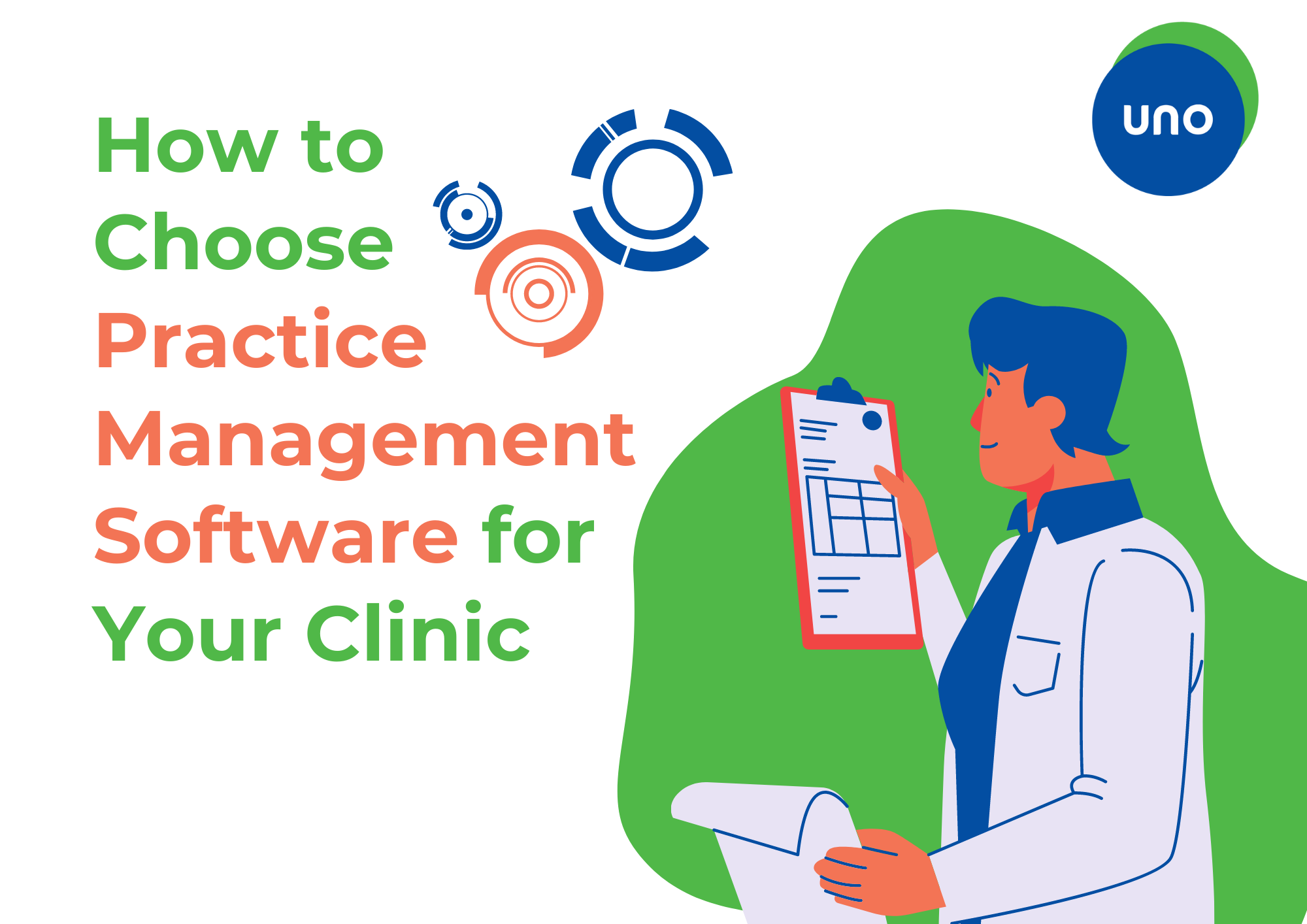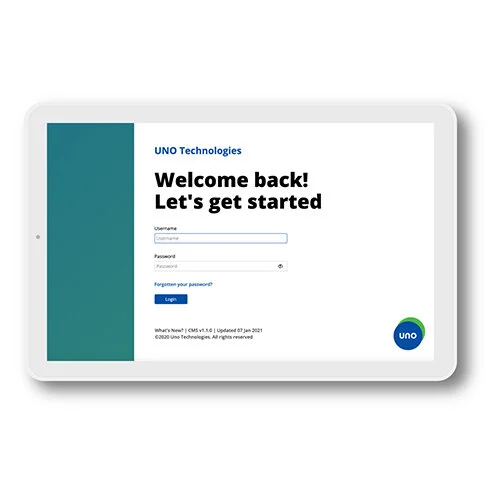How to Choose Practice Management Software for Your Clinic
By: UNO Technologies
Updated on: 22 July 2021
Medical practice management software plays a key role in any clinic’s operations. In the last two decades alone, technology has revolutionized healthcare delivery. Current software enables physicians to virtually see their patients and clinical decision support (CDS) mitigates against medication errors in the form of drug alerts.
Finding the right practice management software is one of the most important tasks for your clinic. It can be challenging as there are plenty of vendors to choose from. In this guide, we’ll explain to you why you need practice management software and offer you some tips on choosing the perfect software for your clinic.
What is a practice management software
Practice management software is a medical software that is used to manage the day-to-day clinical activities in a physician’s clinic or a skilled nursing facility. It also routinely integrates administrative and financial functions to provide end-to-end software that administers every facet of the patient journey (e.g., clinical documentation, prescription, and billing).
Why do you need practice management software?
A Practice Management Software can make or break a clinical practice. It enables physicians and healthcare administrators to achieve the following core functions of any healthcare practice:
Capturing patient information -
Personal identifiers
Age
Sex
Address
Employment & Insurance information
Marital Status
Medical history & data
Medications
Allergies
Scheduling clinic appointments and reduce patient waiting time -
Date/Time/Location
Primary care provider
Pre-consultation triage, biochemistry, or imaging
Reduce no-shows
Reduce wasted timeslots between sessions
Medical billing -
Retrospective and prospective billing
Consolidating payments for health packages
Track outstanding invoices
Generating administrative and business reports -
Data analytics for profitability analyses
Clinic performance overview
Including diagnostic or laboratory code sets for ease of billing -
SNOMED
ICD 9/10
LOINC
Claims processing automation -
Direct claims with government platform
Pre-submission and eligibility check
Claim status updates
While most clinicians are aware of the benefits of a practice management software as relates to clinical documentation, not many are cognizant of the financial benefits. A robust software enables practice owners to generate financial reports which can track the profitability of the healthcare business. These indices include, but are not limited to, accounts receivable, total reimbursements, and the number of patient no-shows amongst others.
How to choose a practice management software?
2020 has changed the way medicine is being practiced. Several healthcare practices have either adopted telemedicine or moved onto a virtual platform altogether in order to maintain their patient load in a time of social isolation.
Here are our recommendations for choosing a practice management software:
Cost
Cost is definitely the first factor you have to consider. A practice management software could vary a lot in cost depending on the size of your clinic, the number of staff involved, and the features you need. Typical rates for a small clinic with 1 doctor and 2 assistants will range between SGD200 and 250 per month. These are estimates that vary depending on negotiations with software sales representatives.
You should also check out the full list of features you will be getting from the software, preferably in written form, to make sure it has what you need and you are getting your money’s worth. Alternatively, you can request a software product demo in order to get a feel of all the functionality and features as well as to ascertain whether the product meets your needs. Don’t miss out on a new software that is more beneficial to your business just because your team has familiarity with older systems or providers.
Ease of use
The practice management software should be easy to use for everyone in your clinic. It’s common to have a transition/teething period in the early stages - but ideally, everyone on your team should not find it difficult to use the new software. Your software provider should also ideally provide on-site training for your staff.
Customization and integration features are also something to look out for. People and clinics work differently, so if the software has customization features to let you adjust it to your preference, it’s definitely a plus.
You should never let your staff’s familiarity with legacy software or workflows be the primary factor when choosing a new practice management software for your clinic. Familiarity does not equate to better. There are many other factors to consider as well, such as dedicated software technical support.
Cloud-based versus On-premise
Cloud-based medical software is preferred to on-premise as it enables you to save money that would otherwise be spent on infrastructure. The upfront capital for hardware and maintenance may put a dent in your account. As the clinic operational cost gets higher and the industry gets more and more competitive, you definitely don’t want to spend unnecessary money on additional hardware and maintenance
Inter-operability with Existing Systems
Depending on whether you already leverage 3rd-party software for your practice, you may want to opt for software that can integrate seamlessly into your practice. For example, if you use dedicated video-conferencing software to hold teleconsultations with your patients, explore medical software which has an in-built telemedical module or can integrate with freely available video-conferencing software. The software chosen should also integrate easily into your clinic’s billing and inventory system.
Proven Success & Robust Support Network
When purchasing a practice software, it’s vitally important to be familiarised with the product on offer. We strongly recommend soliciting feedback from other clinicians regarding the software and evaluating the service-level agreements provided by the vendor.
HIPAA AND MTCS compliance
If you are choosing a cloud-based software for your clinic (which you should be!), make sure the cloud service offered in the software is Health Insurance Portability and Accountability (HIPAA) and Multi-Tier Cloud Service (MTCS) compliant. HIPAA protects the privacy of your patient’s health information, while MTCS ensures the cloud service has information security controls and risk management protocols against any form of security risks.
On-site training and Technical support
A good practice software vendor should provide comprehensive on-site training, especially during the early stages when your clinic staff is adapting to the new system. There will always be teething issues and a learning period when you get new software for your clinic. A qualified and responsible vendor should help you get through this period with the appropriate support and attention a customer deserves.
A responsible and credible vendor should also provide the most dedicated technical support to your clinic. No matter how good the software is, there will always be hiccups. Your vendor should have a dedicated technical support channel to help you resolve your issues.
Ideally, your tech support should respond within minutes, because we all know how important a practice software is to a clinic, a software fault could cause severe operational issues and delays in a clinic as well as unhappy patients! So, if your vendor fails to respond to your issues promptly or takes ages to reply, it’s time to change vendors, no matter how good that software is.
Look for a practice management software? Introducing UNO CMS
Cloud-based
User-friendly and easy to use
HIPAA and MTCS compliant
Fully integrated and compatible
5 years of proven success
Dedicated local support

